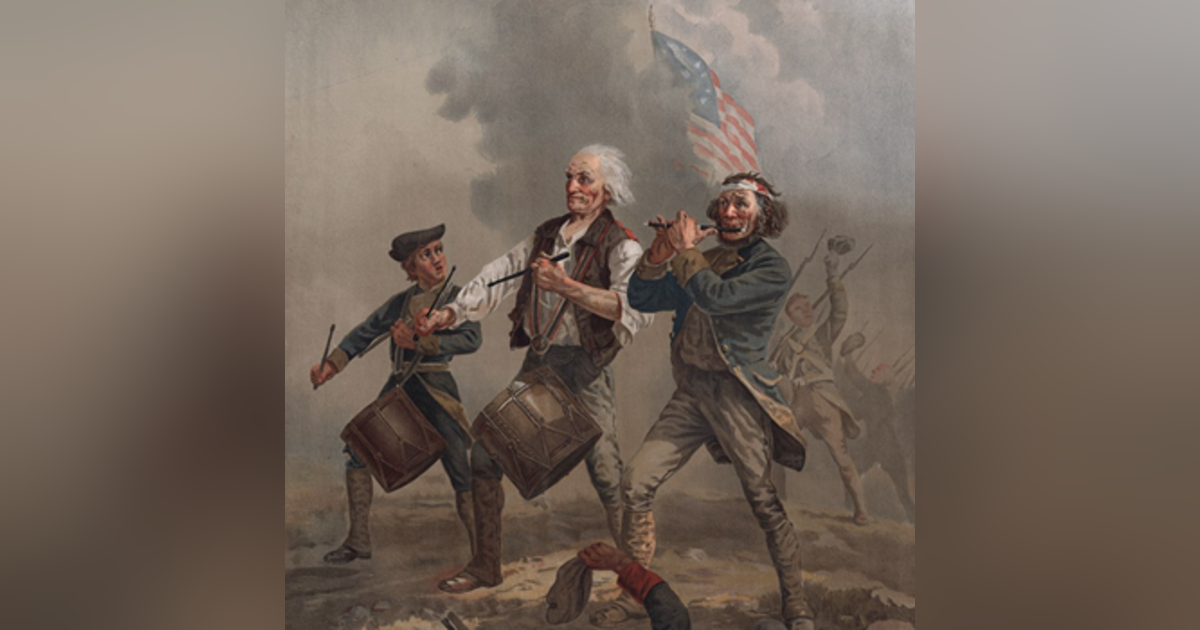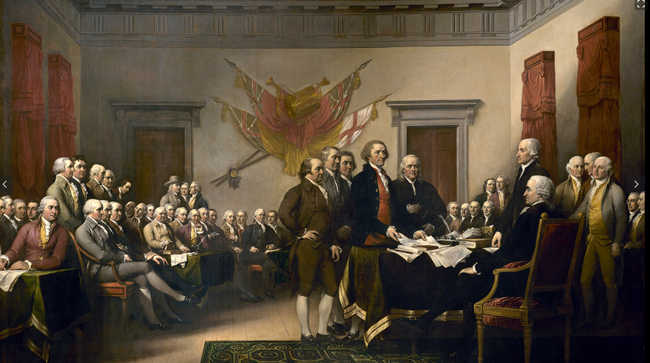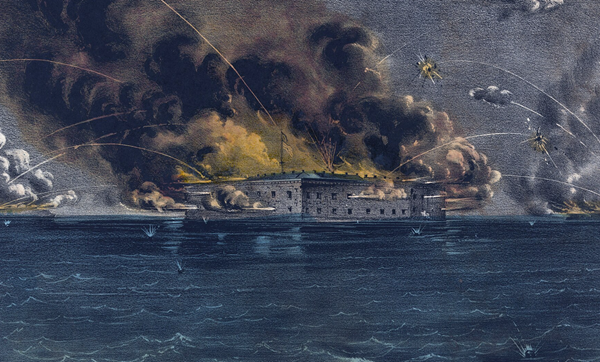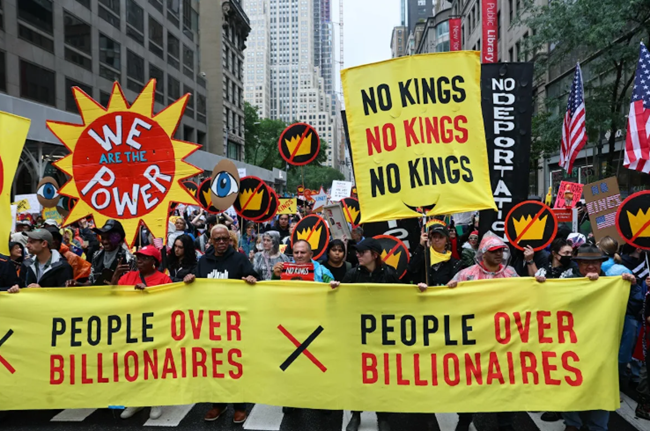Can Ken Burns Get Everyone to Agree on America's Origin Story?

History isn't neat, and it shouldn't be. Ken Burns dismantles sanitized narratives by showing how the U.S. was "forged in violence"—a fact that doesn't diminish the nation's ideals but strengthens our understanding of them. Supporting links 1. Ken Burns [Wikipedia] 2. Ken Burns [Website] 3. Ken Burns [YouTube] 4. Ken Burns [Facebook] 5. What Ken Burns Won't Say About the American Revolution [P...
History isn't neat, and it shouldn't be. Ken Burns dismantles sanitized narratives by showing how the U.S. was "forged in violence"—a fact that doesn't diminish the nation's ideals but strengthens our understanding of them.
Supporting links
1. Ken Burns [Wikipedia]
2. Ken Burns [Website]
3. Ken Burns [YouTube]
4. Ken Burns [Facebook]
5. What Ken Burns Won't Say About the American Revolution [POLITICO]
Contact That's Life, I Swear
- Visit my website: https://www.thatslifeiswear.com
- Twitter at @RedPhantom
- Bluesky at @rickbarron.bsky.social
- Email us at https://www.thatslifeiswear.com/contact/
Episode Review
- Submit on Apple Podcast
- Submit on That's Life, I Swear website
Other topics?
- Do you have topics of interest you'd like to hear for future podcasts? Please email us
Interviews
- Contact me here https://www.thatslifeiswear.com/contact/, if you wish to be a guest for a interview on a topic of interest
Listen to podcast audios
- Apple https://apple.co/3MAFxhb
- Spotify https://spoti.fi/3xCzww4
- My Website: https://bit.ly/39CE9MB
Other
- Music ...
⏱️ 18 min read
So, here’s a question for you. Can Ken Burns Get Everyone to Agree on America's Origin Story?
American history is more polarizing than ever. On November 16, 2025, the country's leading storyteller, Ken Burns, hopes to prove there's still an appetite for the hard truth.
Ken Burns is using his signature, nuanced approach to challenge America's mythologized origin story. Rather than offering a tidy, patriotic tale, he presents the American Revolution as a brutal, messy, and deeply human struggle—one that included not only the Founding Fathers, but also Native Americans, enslaved people, women, and loyalists.
In doing so, he shows that the truth of history is richer—and harder—than the legends we've long been told.
Come November, Ken Burns will explain all.
Welcome to That's Life, I Swear. This podcast is about life's happenings in this world that conjure up such words as intriguing, frightening, life-changing, inspiring, and more. I'm Rick Barron your host.
That said, here's the rest of this story
Democracy's Foundation: Why We Must Learn Our History Together
Ken Burns latest documentary, The American Revolution, isn't a simple rehash of textbook history. Instead, it attempts to strip away the mythology that has long surrounded the founding narrative of America. Across six episodes totaling twelve hours, the series reimagines the struggle for independence not as a clean-cut saga of valorous patriots, but as a messy, violent conflict that tore communities—and families—apart. It presents the Revolution as a battle marked by fragmented loyalties, clashing ideologies, and the pivotal roles played by figures often left out of the mainstream account, including enslaved people and Indigenous leaders like Iroquois negotiators.
The signing of the Declaration of Independence, a John Trumbull's painting. Courtesy of Wikipedia
At 71, Burns shows no sign of slowing down. He has been crisscrossing the country to discuss the film, engaging audiences from museums and classrooms to, surprisingly, The Joe Rogan Experience—a platform better known for controversy than historical reflection. But for Burns, reaching people where they are is part of the point. Preserving democracy, he argues, requires honest, sometimes uncomfortable dialogue—even in spaces not traditionally known for it.
The health of any democratic society rests not on unanimous agreement about its past, but on the collective willingness to examine that history with unflinching honesty. This fundamental truth becomes increasingly urgent as we witness the fracturing of shared narratives and the weaponization of historical memory for political gain. The question before us is not whether we can agree on every interpretation of our national story, but whether we can commit to learning it together, complexities, contradictions, warts and all.
The Peril of Competing Histories
Over nearly 50 years, Ken Burns and his collaborators have crafted more than three dozen documentaries exploring the American experience—from the baseball diamond to the battlefields of Vietnam. Now, as he approaches a milestone in his storied career, Burns is completing perhaps his most sweeping endeavor yet: a cinematic retelling of how the United States came to be.
"What keeps me awake at night—and explains these bags under my eyes," he admitted with a wry smile, "is a simple thing: I just want to tell the story truthfully."
Lean, energetic, and clad in his signature Levi's 505s, Burns has become something of a tireless ambassador for historical understanding. On his nationwide tour to promote the series, he has spoken with heartfelt conviction about his mission to bridge divides through a shared narrative. "I want to restore the 'us' in U.S.," he often says, delivering that message to audiences ranging from cadets at West Point to educators gathered for a social studies convention.
Burns reflects from his past documentaries, but more so with the American Revolution series, that we have witnessed the emergence of what might be called "parallel histories"—competing narratives that serve different ideological purposes rather than seeking to understand the full scope of human experience. These selective interpretations treat historical events as ammunition in contemporary political battles, extracting moments from their broader context to serve present-day agendas. The result is a fragmented understanding of our shared past that undermines the very foundation of democratic discourse.
This phenomenon is not merely academic; it has profound implications for how citizens engage with one another and with their government. When different segments of society operate from fundamentally different understandings of historical events, the common ground necessary for democratic deliberation begins to erode. We find ourselves not debating policy solutions to shared problems, but arguing about the basic facts of our collective experience.
The danger lies not in disagreement itself—healthy democracies thrive on diverse perspectives and vigorous debate—but in the abandonment of a shared commitment to evidence-based inquiry and honest reckoning with uncomfortable truths. When historical narratives become tools of partisan warfare rather than attempts to understand the human condition, we lose the capacity for the kind of informed citizenship that democracy requires.
The Complexity of Truth
Ken Burns points out in the American Revolution documentary that historical truth is rarely simple or comfortable. The events that shaped our nation—from the founding era through the present day—resist easy categorization into heroes and villains, victories and defeats. The American Revolution, for instance, was simultaneously a struggle for liberty and a violent upheaval that displaced indigenous peoples and failed to address the fundamental contradiction of slavery. These multiple truths can coexist without canceling each other out, but only if we approach them with intellectual humility and moral courage.
The tendency to sanitize historical events serves no one well. When we present the Revolutionary War as a clean narrative of patriots versus tyrants, we miss the profound complexity of a conflict that divided families, communities, and entire regions. We overlook the experiences of those who sided with Britain, not out of malice toward liberty, but from genuine beliefs about stability and order. We ignore the Native Americans who found themselves caught between competing colonial powers, forced to choose sides in a conflict that would ultimately result in their displacement, regardless of the outcome.
This complexity does not diminish the significance of the revolutionary ideals or the courage of those who fought for independence. Instead, it enriches our understanding by revealing the full human drama of historical change. It shows us that progress is messy, that good intentions can coexist with tragic consequences, and that the arc of history bends toward justice only through the sustained efforts of imperfect people grappling with imperfect circumstances.
The Democratic Imperative
From Ken Burns perspective, democracy depends on citizens who can engage with complexity, who can hold multiple perspectives in tension, and who can make informed decisions based on evidence rather than ideology alone. This capacity for nuanced thinking is not innate; it must be cultivated through education and sustained through ongoing dialogue. Historical education plays a crucial role in this process, providing citizens with the analytical tools and contextual knowledge necessary for democratic participation.
The Battle of Ft Sumter launched the American Civil War. Courtesy of Wikipedia
Like many of Ken Burns's works, this series aims to challenge widely accepted historical tropes. The filmmakers made a deliberate effort to strip away what Burns refers to as the "barnacles of sentimentality"—those familiar, romanticized images that have come to define the Revolutionary War: Paul Revere's midnight ride, George Washington posed nobly on a boat crossing the Delaware, and the parade of powdered-wig patriots etched into American lore.
Instead, the documentary presents a more nuanced and unvarnished portrayal of a conflict that spanned nearly two decades, claimed tens of thousands of lives, and extended far beyond the iconic skirmishes of Concord and Lexington. As longtime narrator Peter Coyote says in the film's opening, the war raged across "hundreds of places—from the storm-tossed waters near England, France, and the Caribbean, to the farmlands and forests of Indigenous territories."
What you’ll see in the six episodes series is a raw and often harrowing chronicle of the Revolution—far more violent than the sanitized versions usually taught in school. Burns believes that the reluctance to confront the war's brutality stems from a fear that doing so might tarnish the ideals at its heart. But in his view, acknowledging the bloodshed doesn't weaken the principles of liberty and self-governance—it magnifies them.
Ken Burns isn't just telling the story of the American Revolution—he's reminding us that democracy depends on a shared, honest reckoning with the past. His message: We don't have to agree on everything, but we do have to learn together.
Learning Together Across Differences
The goal of historical education should not be to achieve uniform interpretation of past events, but to establish shared standards of evidence and inquiry that allow for productive disagreement. We can argue about the relative importance of different historical factors, the proper balance between individual agency and structural forces, or the lessons we should draw from past events. But these arguments must be grounded in accurate information and honest acknowledgment of the full range of historical evidence.
The alternative—a society where different groups retreat into separate historical narratives that validate their existing beliefs—leads inevitably to the breakdown of democratic discourse. When citizens cannot agree on basic facts about their shared past, they lose the capacity for the kind of reasoned deliberation that democracy requires. Political conflict becomes a zero-sum battle between incompatible worldviews rather than a collaborative search for workable solutions to common problems.
The Role of Institutions
Educational institutions, museums, libraries, and media organizations bear special responsibility for maintaining the conditions necessary for democratic historical discourse. These institutions must resist the temptation to present history in ways that confirm popular prejudices or advance particular political agendas. Instead, they must commit to the more difficult work of presenting the full complexity of historical experience, even when that complexity challenges comfortable assumptions.
This does not mean adopting a false neutrality that treats all historical claims as equally valid, nor does it require abandoning moral judgment about past events. Instead, it means grounding moral decisions in a careful analysis of evidence and acknowledging the full complexity of human actors and situations in history. It means recognizing that understanding why people acted as they did in the past—even when we find their actions morally reprehensible—is essential for preventing similar tragedies in the future.
The Promise of Shared Inquiry
Despite the challenges we face, there is reason for hope. The human capacity for learning, growth, and reconciliation remains strong, even in polarized times. When people are given access to comprehensive historical information and encouraged to engage with it thoughtfully, they often discover that their assumptions were incomplete or mistaken. They find that historical figures they had dismissed as irrelevant or unsympathetic faced dilemmas similar to their own. They recognize that the path to progress has always been complicated and that the work of building a just society remains unfinished.
This kind of historical education can serve as a foundation for democratic renewal. By learning to engage with the complexities of the past, citizens develop the intellectual tools necessary for engaging with the complexities of the present. They learn to appreciate the achievements of previous generations while also acknowledging their failures. They develop realistic expectations about the pace of change and the difficulty of reform. Most importantly, they learn to see themselves as part of an ongoing historical process rather than as passive observers of events beyond their control.
The future of American democracy may well depend on our ability to recover this sense of shared historical inquiry. We need not agree on every interpretation of past events, but we must agree to learn about them together, with honesty, humility, and mutual respect. We must resist the temptation to use history as a weapon in contemporary political battles and instead embrace it as a resource for understanding the human condition and building a more perfect union.
No Kings march across America. Courtesy of Yahoo! News
This is not merely an academic exercise but a vital democratic practice. The health of our republic depends on citizens who can think critically about the past, engage respectfully with different perspectives, and work together toward common goals despite their disagreements. History, honestly taught and openly discussed, provides the foundation for such citizenship. It reminds us that democracy is not a destination, but a journey; not a perfect system, but an ongoing experiment in human self-governance.
What can we learn from this story? What's the takeaway?
As the United States approaches its 250th anniversary next year, public discourse appears more focused on clashing interpretations of history than on seeking a shared understanding of it.
The 2019 release of the 1619 Project by The New York Times—named for the year enslaved Africans first arrived in what would become the U.S.—sparked intense and divisive debate about the enduring impact of slavery on the nation's foundation.
In 2020, the Black Lives Matter movement gained renewed momentum following the killing of George Floyd, an unarmed Black man, by a police officer. The nationwide protests that followed ignited a broader examination of race and historical memory. Confederate monuments were dismantled, and some schools removed the names of Founding Fathers like George Washington and Thomas Jefferson due to their ownership of enslaved people.
Ultimately, the choice before us is clear: we can continue to retreat into separate historical narratives that confirm our existing beliefs, or we can commit to the more challenging work of learning together. The future of our democracy may well depend on which path we choose. The time for that choice is now, and the responsibility belongs to all of us.
We must embrace the complexity of our past if we hope to unite in the future.
History isn't neat, and it shouldn't be. Ken Burns dismantles sanitized narratives by showing how the U.S. was "forged in violence"—a fact that doesn't diminish the nation's ideals but strengthens our understanding of them.
Well, there you go, my friends; that's life, I swear
For further information regarding the material covered in this episode, I invite you to visit my website, which can be found on Apple Podcasts, for show notes and the episode transcript.
As always, I thank you for the privilege of you listening and your interest.
Be sure to subscribe here or wherever you listen to podcasts so you don't miss an episode.
See you soon.













